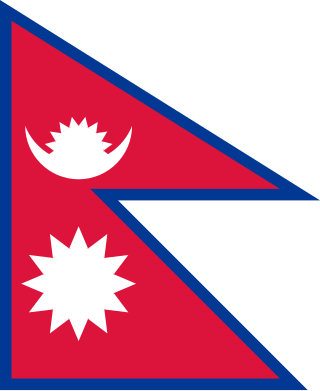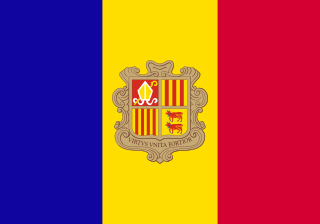This article needs to be updated.(February 2022) |
Stavre Jada (born 18 May 1998 [1] ) is a Macedonian cross-country skier and biathlete. Jada was the flag bearer for Macedonia during the 2018 Winter Olympics Parade of Nations. [2]
This article needs to be updated.(February 2022) |
Stavre Jada (born 18 May 1998 [1] ) is a Macedonian cross-country skier and biathlete. Jada was the flag bearer for Macedonia during the 2018 Winter Olympics Parade of Nations. [2]
All results are sourced from the International Biathlon Union.
0 medals
| Event | Individual | Sprint | Pursuit | Mass start | Relay | Mixed relay | Single Mixed relay |
|---|---|---|---|---|---|---|---|
| | DNF | 97th | — | — | — | — | — |
| | 94th | 96th | — | — | — | — | — |
| | DNF | 103rd | — | — | — | — | — |

Canada competed at the 2006 Winter Olympics in Turin, Italy, with a team of 196 athletes and 220 support staff.

Kenya sent a delegation to compete at the 2006 Winter Olympics in Turin, Italy, from 10–26 February 2006. This was Kenya's third time participating in a Winter Olympic Games. The Kenyan delegation consisted of one athlete, cross-country skier and three-time Olympian Philip Boit. In his only event, he finished 91st in the men's 15 kilometre classical.

The Republic of Macedonia sent a delegation to compete at the 2006 Winter Olympics in Turin, Italy from 10–26 February 2006. This was Macedonia's third appearance at a Winter Olympic Games. The delegation consisted of three athletes; Ivana Ivčevska and Gjorgi Markovski in alpine skiing, and Darko Damjanovski in cross-country skiing. Their best performance in any event was 40th, by Ivčevska in the women's giant slalom.

Nepal sent a delegation to compete at the 2006 Winter Olympics in Turin, Italy from 12–28 February 2006. This was Nepal's second appearance at a Winter Olympic Games, the first having been four years prior. The only athlete sent by Nepal was Dachhiri Sherpa, competing in cross-country skiing. In his only event, the men's 15 kilometre classical, he finished in 94th place.

Slovenia first participated as an independent nation at the Olympic Games at the 1992 Winter Olympics in Albertville, France, and the country has sent athletes to compete at every Games since then. The Slovenian Olympic Committee was established in 1991 and was recognised by the International Olympic Committee on 5 February 1992.

North Macedonia first competed as an independent nation at the Olympic Games at the 1996 Summer Olympics, then as the "former Yugoslav Republic of Macedonia", and has participated in every Summer Olympic Games and Winter Olympic Games since then. Previously, until 1988, Macedonian athletes competed for Yugoslavia, and in 1992 as Independent Olympic Participants. The provisional appellation of "former Yugoslav Republic of Macedonia" was used until 2018, in the context of the Macedonia naming dispute.

The former State Union of Serbia and Montenegro was represented at the Olympic Games on six occasions between 1996 and 2006, when the union was dissolved and Montenegro and Serbia each declared full independence.

The Olympic Games ceremonies of the ancient Olympic Games were an integral part of the games; modern Olympic Games have opening, closing, and medal ceremonies. Some of the elements of the modern ceremonies date back to the ancient games from which the modern Olympics draw their ancestry. An example of this is the prominence of Greece in both the opening and closing ceremonies. During the 2004 Summer Olympics, the medal winners received a crown of olive branches, which was a direct reference to the ancient games, in which the victor's prize was an olive wreath. The various elements of ceremonies are mandated by the Olympic Charter, and cannot be changed by the host nation. Host nations are required to seek the approval of the International Olympic Committee (IOC) for ceremony elements, including the artistic portions of the opening and closing ceremonies.

Brazil sent a delegation to compete at the 2010 Winter Olympics in Vancouver, British Columbia, Canada, held from 12–28 February 2010. The Brazilian team consisted of five athletes competing in three sports.

The Czech Republic participated in the 2010 Winter Olympics in Vancouver, British Columbia, Canada, sending 92 participants, the largest Czech team ever to appear at the Winter Olympics. The Czechs competed in the majority of events, except curling, skeleton and women's ice hockey. Hockey player Jaromír Jágr served as flag bearer at the opening ceremony.

Macedonia sent a delegation to compete at the 2010 Winter Olympics in Vancouver, British Columbia, Canada from 12 to 28 February 2010. The Macedonian delegation consisted of three athletes, alpine skier Antonio Ristevski and two cross-country skiers, Rosana Kiroska and Darko Damjanovski. The nation's best finish was by Ristevski in the men's giant slalom, where he placed 53rd.
During the Parade of Nations at the 2010 Winter Olympics opening ceremony, held beginning at 6:00 PM PST on February 12, 2010, 82 athletes bearing the flags of their respective nations led their national delegations as they paraded into BC Place Stadium in the host city of Vancouver, British Columbia, Canada.
During the 2018 Winter Olympics Parade of Nations at the 2018 Winter Olympics opening ceremony, beginning at 20:00 KST (UTC+9) on 9 February 2018, athletes bearing the flags of their respective nations led their national delegations as they paraded into the Pyeongchang Olympic Stadium in the host city of Pyeongchang, South Korea. 92 teams qualified to compete.

North Macedonia competed at the 2020 Winter Youth Olympics in Lausanne, Switzerland from 9 to 22 January 2020. This was the nation's first participation in an Olympic event under the country's new name.

Andorra competed at the 2022 Winter Olympics in Beijing, China, from 4 to 20 February 2022.

Australia competed at the 2022 Winter Olympics in Beijing, China, from 4 to 20 February 2022.

Belgium competed at the 2022 Winter Olympics in Beijing, China, from 4 to 20 February 2022.

North Macedonia competed at the 2022 Winter Olympics in Beijing, China, from 4 to 20 February 2022.
During the Parade of Nations at the opening ceremony of the 2020 Summer Paralympic Games, athletes from each participating country paraded in the Japan National Stadium, preceded by its flag and placard carrier. Each flag bearer had been chosen either by the nation's National Paralympic Committee (NPC) or by the athletes themselves.